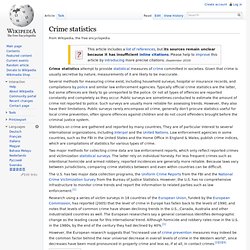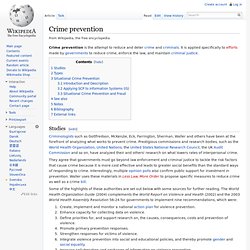

Studying Criminology to benefit yourself and the society around you - My Criminal Justice Degree. There is reason why television shows on crime are so popular.

The entire science of discovering the who, what, where, when and why of crime is so interesting that even the most minute details and discoveries can cause a view to be on the edge of their seat. It is for this reason that so many students have begun to enter the field of Criminology. Becoming a Criminologist gives you a front row seat to solving crime, and although it is an extremely interesting career path, is not nearly as glamorous as portrayed on television. Although it involves science, for the most part you couldn't be a good Criminologist unless you had analytical thinking skills and the ability to think subjectively about the world around you. When studying criminology, you will be exposed to course work beyond the scope of simple criminology. What specifically does a criminologist do? To become a criminologist, you will need an Undergraduate degree with a major in Criminology. What Are the Advantages of Being a Criminologist?
How does Criminology help our understanding of crime and criminals. Over the years many criminologists have been carried out research to find out how much Criminology has helped society's understanding of crime and criminals.

Crime has been existent from the early days well before generations; however the punishments given to individuals and the way in which they are dealt with have changed over time. More greatly the definition of crime has changed and is continuing to change as new laws are constantly being brought into power . Criminology has been defined in a numerous of ways, some say criminology is the study of crime from a social and individual perspective. Looking at it from an educational approach Criminology has been defined as a social science, not only is it concerned with the causes and preventions of crime but the social impacts and reactions to it. As well as criminals themselves, others say that criminology is the study of the criminal justice and penal systems.
Struggling with your essay? Get The Grade You ordered Freelance Writing Jobs. Crime statistics. Crime statistics attempt to provide statistical measures of crime committed in societies.

Given that crime is usually secretive by nature, measurements of it are likely to be inaccurate. Several methods for measuring crime exist, including household surveys, hospital or insurance records, and compilations by police and similar law enforcement agencies. Typically official crime statistics are the latter, but some offences are likely to go unreported to the police. Or not all types of offences are reported constantly and completely as they occur. Public surveys are sometimes conducted to estimate the amount of crime not reported to police.
Statistics on crime are gathered and reported by many countries, They are of particular interest to several international organizations, including Interpol and the United Nations. Two major methods for collecting crime data are law enforcement reports, which only reflect reported crimes and victimization statistical surveys. Counting rules[edit] Crime prevention. Crime prevention is the attempt to reduce and deter crime and criminals.

It is applied specifically to efforts made by governments to reduce crime, enforce the law, and maintain criminal justice. Studies[edit] Some of the highlights of these authorities are set out below with some sources for further reading. The World Health Organization Guide (2004) complements the World Report on Violence and Health (2002) and the 2003 World Health Assembly Resolution 56-24 for governments to implement nine recommendations, which were: Criminology. Criminology (from Latin crīmen, "accusation"; and Greek -λογία, -logia) is the scientific study of the nature, extent, management, causes, control, consequences, and prevention of criminal behavior, both on the individual and social levels.

Criminology is an interdisciplinary field in the behavioral sciences, drawing especially upon the research of sociologists, psychologists, psychiatrists, social anthropologists, as well as scholars of law. The term criminology was coined in 1885 by Italian law professor Raffaele Garofalo as criminologia. Later, French anthropologist Paul Topinard used the analogous French term criminologie.[1] Schools of thought[edit] In the mid-18th century criminology arose as social philosophers gave thought to crime and concepts of law. Classical school[edit] The Classical school of thought came about at a time when major reform in penology occurred, with prisons developed as a form of punishment. Positivist school[edit] Italian school[edit] Chicago school[edit] Victimology.
Victimology is the study of victimization, including the relationships between victims and offenders, the interactions between victims and the criminal justice system — that is, the police and courts, and corrections officials — and the connections between victims and other social groups and institutions, such as the media, businesses, and social movements.[1] Victimology is however not restricted to the study of victims of crime alone but may include other forms of human rights violations.

[citation needed] Victim of a crime[edit] In criminology and criminal law, a victim of a crime is an identifiable person who has been harmed individually and directly by the perpetrator, rather than by society as a whole. However, this may not always be the case, as with victims of white collar crime, who may not be clearly identifiable or directly linked to crime against a particular individual. Consequences of crimes[edit] Victims may experience the following psychological reactions: Penal couple[edit]